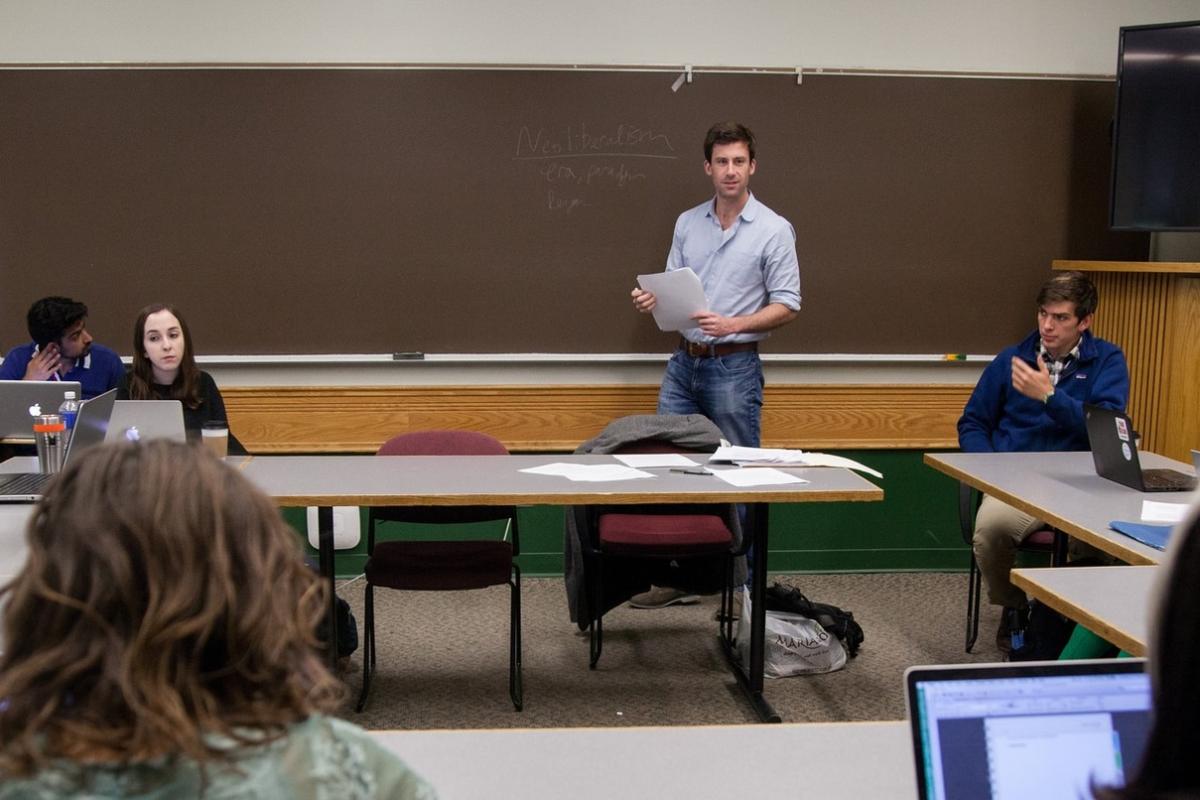Every doctoral candidate with an eye on the academic job market knows the value of having a course you designed yourself on your CV. But with graduate students often tapped to teach existing courses with already-developed syllabi, these opportunities can be hard to come by.
Pozen Center Graduate Lectureships address this dilemma directly, giving up to three advanced doctoral students per year the funding to create and teach a class that connects their subject-area expertise to human rights issues. Applications are open and will be accepted through February 21.
“As a grad student, I have so far mostly been a TA in other people’s classes,” says Kate Petroff, a doctoral candidate in philosophy and one of this year’s lectureship winners. But this spring, she will teach “Are We Forced to Work?,” a course she developed herself. It examines arguments over whether there is a human right to choose a life without work, and, if so, whether that right is being violated by the status quo.
“The human rights framework is a powerful way to frame issues of work and leisure, and connect them to big questions about what all people deserve,” Petroff says. “I’m incredibly excited.”
Teaching Across Disciplinary Lines
Lectureship applications are encouraged from all disciplines, and proposed courses don’t need to deal explicitly with international human rights discourse, laws, or history. What matters is the subject matter’s connection to questions of interest to the human rights community, broadly defined.
For lectureship applicants, the prospect of exploring those connections––and doing so in collaboration with students outside of their core discipline––is part of the appeal.
Sasha Crawford-Holland, one of last year’s lecturers, got the idea for his course while watching the racial justice protests of 2020 unfold. Crawford-Holland, a doctoral candidate in cinema and media studies, noticed the significant role being played by video footage––whether from cell phones or police body cams––in the national conversation about racialized police violence. He knew that media studies had powerful tools for making sense of this footage, and he wanted to share those tools with a broader audience.
The course Crawford-Holland designed, “Documenting State Violence from the Holocaust to Black Lives Matter,” drew students from across the university. Few of them had any prior exposure to media studies, but they were all interested in the urgent contemporary question of how we process images of violence.
“The experience was invaluable for me,” he says. “I learned how to make my disciplinary perspective as useful as possible to students across the university, which really pushed me to articulate it as clearly as possible to myself.”
Exploring New Frontiers of Knowledge
For Austin Clyde, another of last year’s lecturers, the experience of pulling together an interdisciplinary course on a cutting-edge issue had an afterlife well beyond the last day of class.
Clyde’s Pozen Center course, “Artificial Intelligence, Human Rights, and Democracy,” drew students from his own discipline, computer science, but also from law, sociology, political science, and art. “The topic is so new that there’s no well-defined canon of work to turn to out of habit,” he says. “It’s all still being figured out, which made it incredibly energizing.”
Interest in the course was so strong that many students were turned away. This motivated Clyde to put together, in collaboration with the Pozen Center, a well-attended day-long symposium on the same subject, featuring panels and talks from scholars across UChicago and beyond, including a keynote address from Harvard professor Sheila Jasanoff.
“My experience with the Pozen graduate lectureship lives forever on my CV, but also in all the intellectual connections that were formed,” Clyde says. “Students from my class are still emailing me about how they’re continuing to pursue the subjects we dug into together.”
Supporting Innovation
History PhD candidate Syrus Jin, one of this year’s lecturers, found that preparing a class for the human rights space motivated him to explore new teaching methods.
In consultation with Pozen Center staff about his Winter quarter course, “American Wars in the 20th Century World,” Jin developed a plan to replace some traditional research papers with public-facing forms of writing like op-eds and review essays, in recognition of the fact that many undergraduates drawn to human rights courses are interested in human rights advocacy.
The experience of teaching at the Pozen Center, he says, nudged him “out of the box I would normally feel if I was teaching a history course. There’s a bigger tent that I can pitch. I know that teaching this course has the possibility of being transformational for me.”
The lectureship advances the Pozen Center’s mission of cultivating a new generation of scholars equipped to contribute to the interdisciplinary analysis and promotion of human rights.
- Learn more about Graduate Lectureships, including application requirements and funding details
- Apply by March 21 at 11:59 p.m. CT

